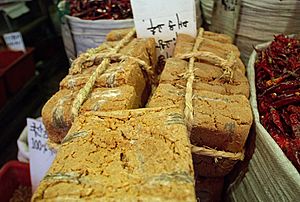Meju facts for kids
Meju is a special block of soybeans that has been fermented. It is a very important ingredient in Korean cuisine. Koreans use meju to make essential condiments. These include soy sauce (called kanjang), soybean paste (doenjang), and red chili pepper paste (gochujang).
Meju is made by drying a block of soybeans. As it dries, the soybeans naturally ferment. There are different ways to make meju. Traditionally, people would boil soybeans. Then, they would crush them in a mortar and shape them into a brick. Finally, they would tie the brick with straw to hang and dry.
In the past, many Korean families made their own meju at home. Because of this, the condiments made with meju tasted unique. Each family's meju had a slightly different flavor. Today, most Koreans buy their traditional condiments from stores. This means it is harder to find the wide variety of unique flavors that homemade meju once offered.
What is Meju?
Meju is a key part of many Korean dishes. It is not eaten by itself. Instead, it is used to create other flavorful ingredients. Think of it as a base for delicious sauces and pastes.
How Meju is Made
Making meju involves a natural process called fermentation.
- First, soybeans are cooked until they are soft.
- Next, the cooked soybeans are mashed.
- Then, they are pressed into a block or brick shape.
- These blocks are hung up to dry, often in a warm place.
- During drying, tiny living things like bacteria and fungi start to grow on the meju.
- These tiny organisms cause the soybeans to ferment. This changes their flavor and texture.
- The fermentation process can take several weeks or even months.
History of Meju
The word meju has changed its meaning over time. Long ago, meju referred to all the different condiments and seasonings made from it. Later, another word, jang, became more common for these finished condiments. So, the word meju then started to mean only the fermented soybean block itself. It became known as the step before making the final condiments.
Some experts believe that the Japanese word miso came from the Korean word meju. Miso is a Japanese paste that is similar to Korean doenjang. This shows how food traditions can be connected across different cultures.
See also
 In Spanish: Meju para niños
In Spanish: Meju para niños
 | Tommie Smith |
 | Simone Manuel |
 | Shani Davis |
 | Simone Biles |
 | Alice Coachman |


